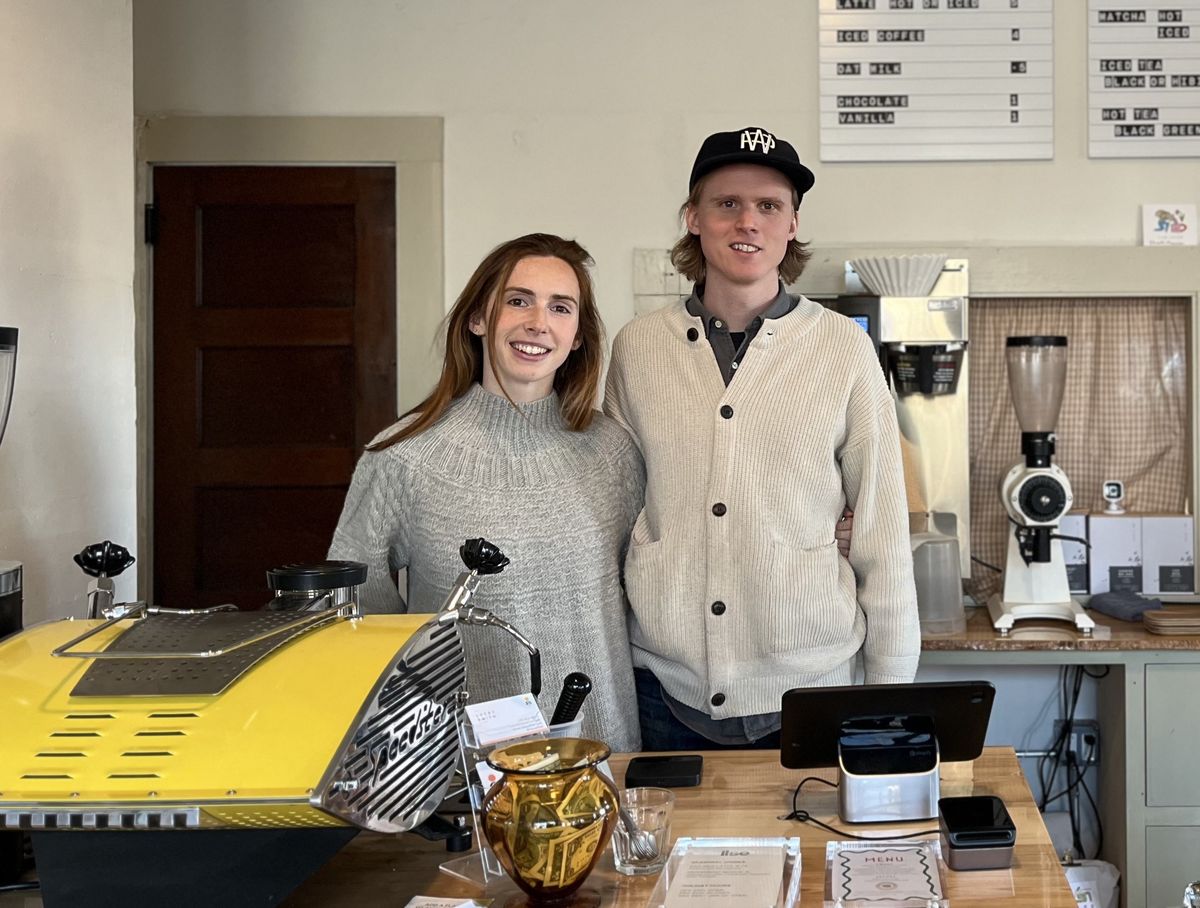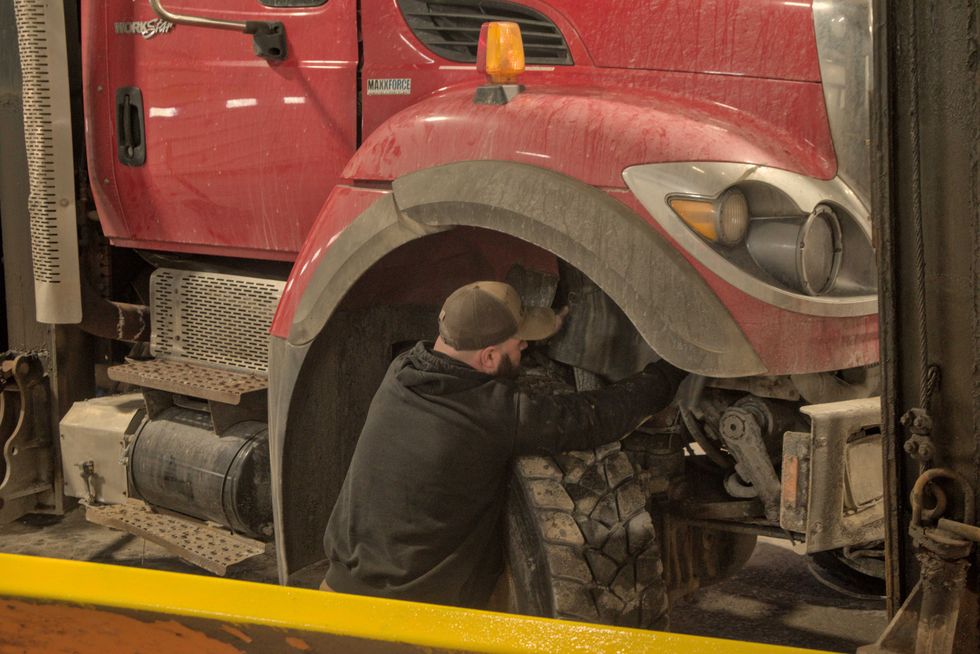North Canaan's Ilse coffee brewers

Owners Rebecca Grossman, left, and Lucas Smith of Ilse Coffee in North Canaan, Conn.
Photo by Natalia Zukerman

A very unique coffee experience is brewing at the Ilse coffeeshop on Railroad Street in North Canaan, Connecticut, in the old location of Jim’s Garage.
The light-filled and airy space is a testament to the dedication of its founders, Rebecca Grossman and Lucas Smith. About five years ago, Smith, while working at Provisions, the café at the White Hart Inn in Salisbury, encountered a coffee that forever changed his perspective on the beverage.
“Until then,” Smith explained, “coffee was just this harsh, bitter thing they put milk and sugar in just for caffeine. And then I had a cup of coffee that tasted kind of floral and tea-like, and it just blew my mind. I never knew coffee could taste like that. And then that was it.”
Originally from the Berkshires, Grossman was home on vacation from Holyoke when she and Smith met at the White Hart. Through Grossman, Smith connected with a coffee roasting company near her school and found himself learning the art of coffee roasting and the intricacies of the coffee world. When Grossman graduated, the couple moved back to Smith’s hometown of Westport, Connecticut, to help his mother open a restaurant in nearby Fairfield.
There, they rented a roasting machine and started their company by buying coffee, paper bags, and a few stickers. “We were working full-time at his mom’s restaurant,” said Grossman. “We barely had a day off, so we would work after hours. It was just the two of us for the first maybe two and a half years of the business.”
“We had $1,000 and a credit card,” laughed Smith.
“It was pretty naïve, honestly,” added Grossman. “I think most people start companies with a lot more money than we did. We just kind of went for it.”
They went for it, and it began to work for them. Soon, Grossman and Smith moved back to Canaan and opened Ilse, named after Smith’s grandmother. “This is kind of where the journey started,” Grossman mused, “so it’s a very cool coming home.”
They started out with mostly a wholesale, direct-to-consumer business on their website, opening the cafe space just eight months ago. They transformed the old garage into a bright and cozy spot for coffee lovers, an open concept space that showcases their entire production. This transparency also translates to their inspiring mission of quality and sustainability.
Their approach is both global and personal, sourcing beans from countries such as Ethiopia, Colombia, Honduras, Guatemala, Mexico, Kenya and Rwanda. Their focus is on supporting small farmers by establishing a practice of buying entire harvests. Grossman explained: “We buy from producers, and we really commit to them, which is a super important thing. We’ll buy their coffee every harvest.”
Smith added: “Coffee farmers have one harvest a year, sometimes two. We’ve been in business for five years, and there’s a number of producers that we’ve been working with for all of those five years, which is really cool.”
Meeting and creating sustainable relationships with the coffee producers is a goal of their business. Smith said, “Our whole focus is really working to establish connections and relationships with all the countries we source.” They explain that this connection has been easier in some countries than others. The couple was able to travel to Colombia last January, and plans to visit every year. “Other countries, it’s a little bit harder to establish relationships,” said Smith, “but it’s a goal for us to have those relationships everywhere that we source.”
The couple has a clear passion for coffee, which extends to their passion for education. Each bag of coffee that they sell has the origin story on the back, showcasing the name of the grower and the farm. Everything from the altitude to the variety of the seed itself to the flavor profile is listed on the bag. There’s also a cost breakdown, which adds to the transparent approach.
“We get asked all the time if our coffee is fair-trade, and we’re actually paying far above fair trade,” Smith explained. “Fair trade is a certification that provides the producer X amount above the stock market price for coffee. And so, we don’t trade coffee based on the stock market. At any given time, we’re paying usually about 200% above the fair-trade price for our coffee. So, you can look at any of our bags, you just turn it on the back, and you can see how much the producer got paid and how much we paid for the coffee.”
Grossman added: “A lot of the farmers that we’re buying from are in producer-led initiatives. So the producers are setting the price, which is super important.”
Grossman and Smith’s business practices are unique, and so too is their roasting style, which they describe as influenced by Nordic methods. There is a focus on bringing out the natural flavors, showcasing the coffee’s inherent qualities. Their favorite, preferred and recommended brewing method is a manual brew method using a Hario V60 pour-over that they sell in their shop. It brings out the flavors and “makes a really nice, clear cup,” said Grossman.
There’s a bit more construction planned in the space to have it “exactly like we want it,” said Smith, but once the renovation is complete, the couple wants to host events and coffee tastings, home brewing classes, and a “seed to cup” course. Said Smith, “Most people don’t even know that coffee’s a seed of a fruit. It’s not a bean.” He almost yells with wonder, “It’s a seed!”
Grossman added to his enthusiasm: “It’s an agricultural, seasonal product, grown in a fruit. Our coffee is seasonal and rotates throughout the year. I don’t think people are aware of that.” She said, “I know I certainly wasn’t before I got into coffee.”
Smith and Grossman’s story is one of passion, dedication, and a deep respect for coffee and the people who grow it. Starting with minimal resources, they’re excited to be able to grow alongside the small and supportive community of specialty coffee roasters in the area. “There’ve been hard moments, but it’s been amazing,” said Grossman. Smith added: “When we started the company, our big thing was helping people experience how great coffee can be. So if people actually want to see coffee in a different perspective rather than the way that they know it, then I think this would be a good place to come and check out.”
A water main under Indian Lake Road in Amenia sprays water after construction workers with C. Gallagher Contracting, of Brewster, New York, attempted to cut the pipe to replace a damaged section on Tuesday, Jan. 27. Crew members said high pressure in a pipe encumbers cutting, fills the hole with too much water, and could cause workers to be too wet for the extremely low temperatures.
AMENIA — Amenia's water system struggled under the stress of frigid temperatures on Tuesday, Jan. 27, as two leaks sprung from water mains in different parts of town.
An emergency break under Indian Lake Road required a section of pipe be removed and completely replaced. C. Gallagher Contracting of Brewster, New York, provided excavation and pipe repair services for both breaks.
The pipe was fixed by 9:30 p.m. and water service was restored to affected customers, crew members said.
Flow from the pipe had not slowed at 8:30 p.m. even after shutting one of the valves, crew members on site said. Representatives of VRI Environmental Services — Amenia's contracted water system operator — located other valves and fire hydrants to further reduce pressure in the pipe shortly before 9 p.m.

Pat Cusano, of North Salem, New York, assisted the Gallagher crew on Tuesday for two water main breaks in Amenia. The first sprung up on Depot Hill Road and was reported by resident David Intrieri at 8:45 a.m.
The Depot Hill Road leak was patched with a collar seal that wrapped around the leak. The crew put the collar in place around 2:30 p.m.
Cusano said the crew went immediately to the Indian Lake Road leak after that, but the first valve couldn't be located until roughly 7:30 p.m.

Imprecisely marked valves on a map of the town's water system caused significant delays in repairing the Indian Lake Road leak, crew members said. Water Committee Chair Bill Flood said VRI only recently took over managing Amenia's water system, and company representatives were still becoming familiar with the district's layout.
Cusano said locating the valves was further complicated by large snowbanks hiding the infrastructure.
VRI representatives said there is a break in Millerton as well, but the leak did not require immediate attention. Crews are expected to patch that leak tomorrow.

The breaks were caused by the extreme cold weather, crew members said. Cold temperatures can cause dirt to shift and contract, putting stress on pipes that are up to 30 years old in Amenia.
"There'll be more tomorrow, and the next day, and the next day," Cusano said. "It's just that time of year."
Stanford locals utilize the snow covered hill below Stanford Town Hall on Route 82 on Friday, Jan. 23, before the weekend's snow storm deposited up to 18 inches across northeast Dutchess County.
Heavy snow blanketed Dutchess County on Sunday, Jan. 25, triggering a county-wide travel ban and a state of emergency.
Parts of the northeast corner of the county saw as many as 18 inches of snow. Temperatures are projected to remain below freezing well into next week.
Gov. Kathy Hochul declared a state of emergency leading up to the storm, as did Dutchess County Executive Sue Serino.
Snowfall totals exceeded forecasts across northeast Dutchess County, with heavy, persistent bands producing more than a foot and a half of accumulation. Schools, municipal offices, churches and numerous community events were canceled or postponed through Monday as plowing operations continued and temperatures dropped into the single digits overnight.

Road crews across the region said they felt prepared heading into the storm. While storms of this magnitude are relatively rare, crews expressed confidence that the cold temperatures would keep the snow lighter and easier to manage.
Visits to North East, Amenia, Washington, Stanford and Pine Plains found salt supplies well stocked and equipment in good working order ahead of the snowfall.
In Stanford, Highway Superintendent Jim Myers and his crew were strapping plows to trucks in the town garage on Friday morning, Jan. 23. Myers said the town was as ready as it could be — a sentiment echoed by highway departments throughout the region.
"You just got to stay on top of it," Myers said. "Keep going."
Labor shortages remain a concern during major storms, crew members said, noting that county and state resources can be stretched thin in more remote areas. In many towns, local road crews are only responsible for town-owned roads, with county and state crews often responsible for the numbered highways and routes.

Some weather models are predicting that another winter storm may hit the Northeast on Sunday, Feb. 1, and Monday, Feb. 2. Predictions are still early, but they suggest more snow is coming.
Dutchess County operates a warming center assistance program through its Department of Child and Family Services. Residents in need of a safe, warm place to stay may call 845-486-3300 from 9 a.m. to 5 p.m. Monday through Friday or 211 after 5 p.m. for assistance in finding shelter.
Additional reporting by Christian Murray
Route 44/82 west of Millbrook, near Cornell Cooperative Extension, was clear as of 2 p.m. Monday, Jan. 26, following the snowstorm.
Dutchess County officials lifted the county-wide travel at noon Monday, Jan. 26.
The announcement came Monday morning at 9:30 after heavy snowfall Sunday blanketed the county with up to 18 inches in some places, according to totals reported on the National Weather Service's website.
The county is still under a Winter Storm Warning until 7 p.m. Monday, Jan. 26. Dutchess County Executive Sue Serino said in a statement that residents should continue to stay home unless traveling is necessary while cleanup efforts continue.
Snow covered Route 44/22 near the Maplebrook School campus in Amenia at 10:30 a.m. Sunday, Jan. 25.
Dutchess County officials issued a travel ban on all public roads from 5 a.m. Sunday, Jan. 25, to 5 p.m. Monday, Jan. 26.
The National Weather Service issued a Winter Storm Warning for much of upstate New York on Friday. Forecasts call for between 10 and 20 inches of snow across northeast Dutchess County.
Road crews across the region told The News that they are feeling prepared.
Visits to North East, Amenia, Washington, Stanford and Pine Plains revealed the salt is in good supply and the equipment is in good working order ahead of the storm.
Stanford Highway Superintendent Jim Myers and his crew were strapping plows to a truck in the town garage on Friday morning, Jan. 23. He said the Stanford road crew was as prepared as it can be, echoing a common sentiment among crews in the region.
"You just got to stay on top of it," Myers said. "Keep going."
County Executive Sue Serino said in a post on FaceBook that all non-emergency and non-essential travel is forbidden until 5 p.m. Monday. Only emergency personnel, road crew members, employees deemed essential for facility operation and news media covering the storm are permitted to travel during the ban.
All others are required to stay home. Pine Plains Highway Superintendent Carl Baden said that's the safest course of action during the storm.
"Just stay home," he said. "We can make it a lot safer for you if you wait."